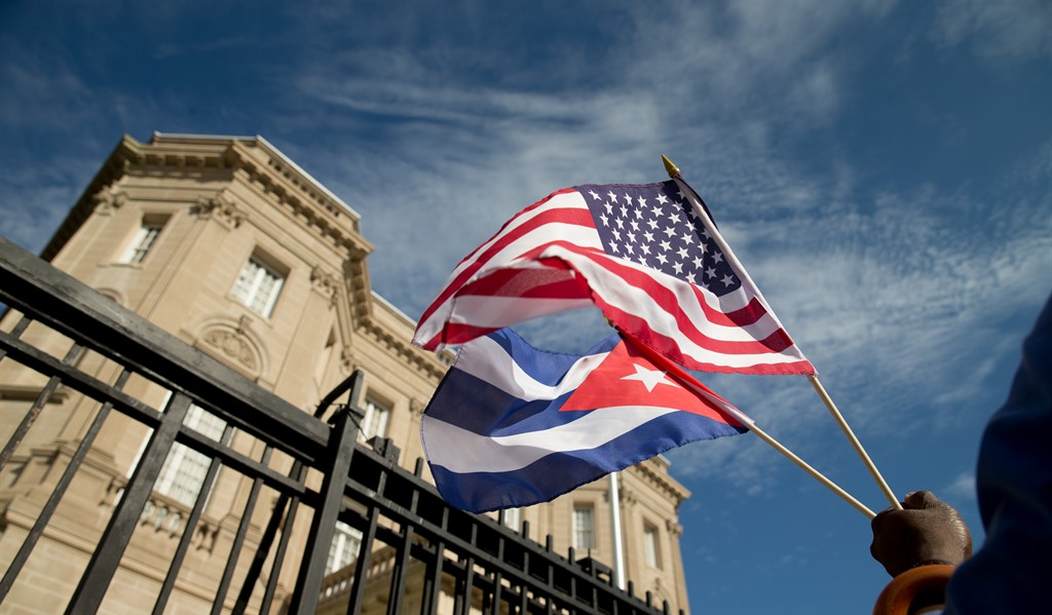The United States and Cuba reestablished diplomatic relations today, with new embassies being opened in each of the nations' respective capital cities. The two nations severed ties in 1961 and remained at odds throughout the Cold War. The chilly relationship continued into the 21st century. Last December, President Obama extended a diplomatic olive branch when he struck a deal with Cuban leaders to begin normalizing relations.
Cuba's Foreign Minister, Bruno Rodriguez, personally raised the Cuban flag outside the Cuban embassy as part of the opening ceremony today. Despite the favorable diplomatic development for his own country, he did not shrink from pushing for more pro-Cuba action on the part of the United States. He said:
“The historic events we are living today will only make sense with the removal of the economic, commercial and financial blockade, which causes so much deprivation and damage to our people, the return of occupied territory in Guantánamo, and respect for the sovereignty of Cuba."
Rodriguez is scheduled to meet later today with U.S. Secretary of State John Kerry. Kerry, in turn, will inaugurate the U.S. Embassy in Havana on August 14.
The U.S. trade embargo on Cuba was initiated in 1960 during some of the most tense days of the Cold War. It was expanded under President Kennedy in 1962 to bar all imports from Cuba. The embargo became a moral instrument in 1992 when Congress passed the Cuban Democracy Act, which stipulated that the U.S. would maintain the sanctions until Cuba moved toward "democratization and respect for human rights." Bill Clinton also expanded the embargo in 1999 by banning foreign subsidiaries of U.S. companies to do business with Cuba. Despite the ongoing ban on Cuban imports, the U.S. remains the fifth largest exporter of goods to Cuba.
Recommended
Cubans have long resented the embargo, which they see as a major obstacle to Cuban economic advancement. Last year, President Obama expressed a strong willingness to end the embargo, yet he also acknowledged that Congress holds the key to such a development:
"The embargo that's been imposed for decades is now codified in legislation. As these changes unfold, I look forward to engaging Congress in an honest and serious debate about lifting the embargo."
The president could have real trouble getting Congress to adopt his views on diplomatic re-engagement. Republicans have criticized his move, saying that it only reinforces the standing of a dictatorial government that denies its people human rights. Presidential candidate Sen. Marco Rubio (R-FL), a son of Cuban immigrants, made this point last December and argued that ending the embargo would not help the Cuban people:
“This entire policy shift announced today is based on an illusion, on a lie — the lie and illusion that more commerce, more access to money and goods will translate to political for the Cuban people. All this is going to do is give the Castro regime, which controls every aspect of Cuban life, the opportunity to manipulate these changes to perpetuate itself in power.”
More recently, Sen. Ted Cruz — also a presidential candidate and descendant of Cuban immigrants —vowed to help block funding for the U.S. embassy in Cuba as well as any nominee for ambassador, “unless and until the president can demonstrate that he has made some progress in alleviating the misery of our friends, the people of Cuba."
Republicans in Congress stand mostly united in opposing an unconditional end of the embargo, but Democrats generally support the president's moves. Democrats will likely present new legislation to try and undo the strict terms of the current embargo, but Republicans stand poised to block it
























Join the conversation as a VIP Member